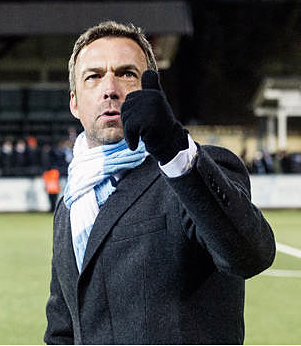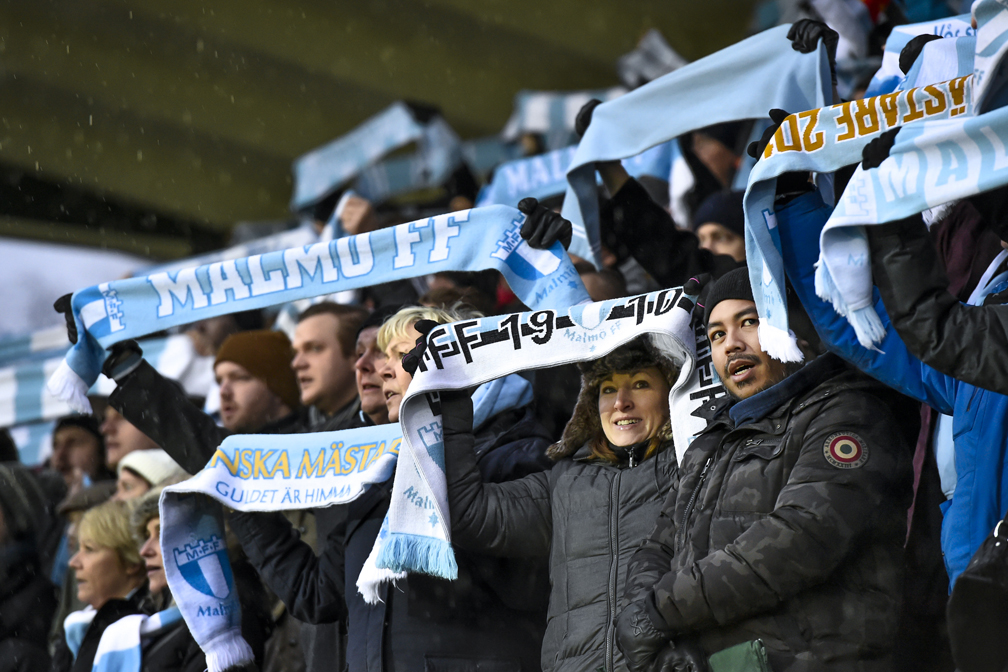Swedish team makes good use of European windfall
Malmo has reaped the financial rewards of playing in the European Champions League.
-
 Malmö trainer Allan Juhn gives a thumbs up after Malmö FF wins on Feb. 20. Bildbyrån image.
Malmö trainer Allan Juhn gives a thumbs up after Malmö FF wins on Feb. 20. Bildbyrån image. -
-
Malmö president Niclas Carlnén makes no secret of wanting his club to become the next Rosenborg, the Norwegian side that funded a decade of success by always reaching the group stage of the UEFA Champions League.
Malmö accomplished the same feat in 2014 and 2015, and despite collecting just a win and tie in eight games, the Sky Blues made out like bandits. Last year, Malmö raked in nearly a half-billion Swedish crowns ($59 million), a record amount for any Swedish sports team. Malmö’s profit was more than 235 million crowns ($27.7 million), another Swedish record for a sports franchise. The massive war chest has transformed Malmö from a minnow to a shark as the Swedish club is now able to compete for players — to an extent — against larger European clubs. And, it is poised to rake in even more money as it puts its Champions League earnings to good use.
“We have expanded our youth development, improved our training facilities and we will pay off the remainder of what we owe on Swedbank Stadion,” said club CEO Niclas Carlnén. “We are in a very strong position financially and we can compete now in the transfer market.”
Malmö has already flexed its muscles, plucking Danish star Anders Christiansen from Italian Serie A club Verona for a reported 10 million crowns ($1 million). Almost overnight, Christensen made Malmö the favorite to once more win the Lennart Johansson trophy in the Allsvenskan after finishing fifth in 2015. The Sky Blues won a bidding war for Iceland international Vidar Örn Kjartansson and was able to prevent Spanish club Real Valladolid from grabbing up Under-21 Swedish international Oscar Lewicki. The Skåne side then beat several teams in France for the services of Ghanaian teen Samuel Tetteh, a player many scouts have compared to former French superstar Zinedine Zidane.
Malmö’s biggest acqiuisition, however, was luring Danish coach Allan Kuhn away from Aalborg in the Danish Superliga. He replaced Åge Hareide, who left Malmö to become manager of the Danish national team. Kuhn helped transform FC Midtjylland into a Champions League group stage side and was instrumental in developing an offensive, possession-based style of soccer the entire club adopted from the youth teams to its professional side. -
 Malmö has reaped the financial rewards of playing in the European Champions League. Photo: Christian Örnberg/Bildbyrån
Malmö has reaped the financial rewards of playing in the European Champions League. Photo: Christian Örnberg/Bildbyrån -
-
Next Scandinavian superclub
The moves and the money have Malmö poised to become the next Scandinavian superclub. Rosenborg, which ruled Norwegian soccer for more than a second in the late 1990s and early 2000s, was the first Scandinavian side to use its success in European play to fuel dominance in its domestic league, which in turn, kept Rosenborg in the Champions League. Rosenborg, however, invested heavily in players season by season, squandering much of its European earnings and when it failed to win the Norwegian League in 2007, the good times the club enjoyed came to an end.
“Certainly Rosenborg is the model for Scandinavian teams, but we don’t want to just throw away money on players,” Carlnén said. “Rosenborg made many mistakes and we want to avoid those. We are investing much of the money we have made back into the club to become stronger in the future.” -
Poised to win
Malmö finds itself in a unique position going into the 2016 season. For the first time in three years, Malmö has no European matches and can concentrate on the league and the Swedish Cup. The Cup offers the easiest route into European play, albeit in the UEFA League, which is financially less lucrative than the Champions League. Malmö’s new signings have made it the instant favorite to win the Allsvenskan and Kuhn has a squad that can compete in Europe. It features Danish international Christiansen, Norwegian internationals Wolf Ekrem and Jo Inge Berget, Swedish internationals Johan Wiland in goal, Lewicki, Anton Timmerholm and Markus Rosenberg, Peruvian international Yoshimar Yotun and Uruguayan international Felipe Carvalho. The all-star lineup got its first test February 21 when Malmö had its first Swedish Cup group stage match. -
Shaky start
The Swedish FA adopted a UEFA-style format for the Swedish three years ago, with qualifiers in the fall. The 32 teams that advanced play in eight four-team groups. The group winners advance to the quarterfinals, followed by semifinals and a one-match final in May. Malmö opened Group 5 against Superettan side IK Sirius and for 45 minutes looked like anything but a championship-caliber side. Playing before a sparse crowd in a rainy, slushy mix, Malmö played the first half as though it wished it was back in sunny Dubai, where it held its preseason training camp. Sirius went ahead after just minutes when Kingsley Sarfo rolled the ball past Wiland. Berget tied the game with a booming shot from 35 yards. Malmö was much better in the second half but still looked shaky. Berget eased any fears of a complete letdown when he headed in a corner from Yotun in the 77th minute.
“Obviously I am happy with the win,” Kuhn said after the match. “Sirius played a very good game. They were better than we were in the first half and deserved their goal. We were better in the second half and they could not stand up to our pressure.” -
Chipp Reid
-
-
